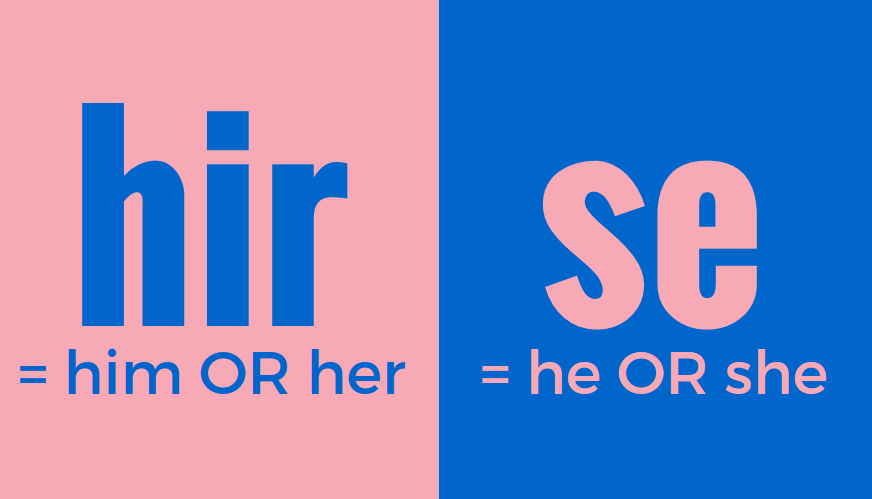Ladies, you need to get behind me on this one.
Among the many shortcomings of the English language is the old-fashioned practice of relying on “man” to refer to “the entire human race,” because it’s a man’s world. For example:
Man does not live by bread alone. (Jesus)
Try not to become a man of success, but rather try to become a man of value. (Einstein)
That’s one small step for [a] man, one giant step for mankind. (Armstrong, who forgot the “a.”)
Sexist! Non-inclusive! What about the ladyfolk, Einstein? Where’s the love for the mommas, Armstrong? Shakespeare tried to get it right when he said:
All the world’s a stage, and all the men and women merely players.
But you know this killed him. Why “men and women” when he really meant “people”? Later in this passage, he has to resort back to the male voice:
All the world’s a stage,
And all the men and women merely players.
They have their exits and their entrances,
And one man in his time plays many parts,
His acts being seven ages.
Today he would have to phrase it like this:
All the world’s a stage,
And all the men and women merely players.
Both men and women have their exits and their entrances,
And one man or woman in his or her time plays many parts,
His or her acts being seven ages, give or take.
Not exactly Tony Award-winning language. Perhaps this is why classic rock band Rush changed Shakespeare’s quote to:
All the world’s indeed a stage. And we are merely players.
Much better! Thank you, Geddy Lee! But Rush got around it with the plural pronoun, which is the writer’s hack for overcoming this shortcoming of the English language.
Because I run a content marketing company, we are in the business of words. This his/her, she/he nonsense is a real problem. We spend hours on these workarounds, and it translates into millions of dollars in lost productivity and inadvertently offending clients. You can’t just write:
Anyone can apply, as long as he has a functioning lower intestine.
Horrible! Biased! Gender non-inclusive! And yet, consider how much worse this sounds:
Anyone can apply, as long as she has a functioning lower intestine.
“They’re only accepting applications from women with healthy digestive systems?” you ask yourself. So we try the plural pronoun hack:
Anyone can apply, as long as they have a functioning lower intestine.
Some grammar guides say this is correct, but “they” is clearly plural, where “anyone” is singular. The two do not match. It is not correct. Screw the grammar guides; they are wrong.
Any people can apply, as long as they have a functioning lower intestine.
This is technically correct, but awful. There’s got to be a better way.
The Solution: Two Gender-Neutral Pronouns
This will come as a shock to many Americans, but there are other languages besides English. Some of them are better than English in certain ways. Many Asian languages, for example, have no gendered pronouns, because their language does not have a grammatical gender system. On the other hand, some languages are even more gendered, like most of the Romance languages (so named to persuade women that male-dominated languages are romantic).
A gender neutral pronoun can be used to signify “he or she,” or “him or her” with one tidy syllable. Some writers try to accomplish this now, with a punctuation hack:
If any student is interested, s/he should keep it to him/herself.
S/he? Really? That looks like an operating system, or the name of a unisex cologne. We need a single word, a short, single syllable that means both “him” and “her.” Here is a solution.
Hir = “Him OR Her”
“Hir” is a combination of “him” and “her,” pronounced “here.” Proper usage:
No matter who I meet, I always look hir in the eyes.
If you see anyone giving away free pie, tell hir I’d like a slice.
The condom is ribbed for hir pleasure.
I understand this looks weird. Everything new looks weird at first. You’ll get used to it.
Se = “He OR She”
“Se” is a combination of “he” and “she,” pronounced “see.” Proper usage:
A good employee should take baths frequently, so se will smell appealing.
After the patient receives his eye transplant, se can see!
The cool thing about language is that anyone can invent any word se needs.
The beauty of these two pronouns is they give equal weighting to the sexes. “Hir” has two letters from “him,” but it sounds more like “her.” “Se” starts with the feminine “s,” but it is two letters, like “he.”
Some women may feel that centuries of English language oppression with the male pronoun means that we need to tilt things the other way for a change, and give women the priority. I understand this point of view, but hey, let’s not get emotional.
Kidding. I’m kidding. Ow! Please tell hir to stop hitting me with hir handbag!
(Only correct if both men and women are hitting me with handbags. See how that sexist remark is instantly defused with our new gender-neutral pronouns?)
Seriously: I need the women to make this idea work. Share this post, and start using these words. Guys have had almost 2,000 years to change this system, so I doubt they’ll be in a big hurry to help. If you know another English language speaker in your neighborhood, tell hir about it. Se will thank you.
Sir John Hargrave is the CEO of Media Shower and author of the upcoming book Mind Hacking. This post is free to distribute under CC 4.0: if you know someone who would like it, please share it with hir.
